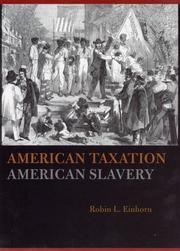| Listing 1 - 3 of 3 |
Sort by
|
Book
ISBN: 9781400855353 1400855357 Year: 2014 Publisher: Princeton, NJ
Abstract | Keywords | Export | Availability | Bookmark
 Loading...
Loading...Choose an application
- Reference Manager
- EndNote
- RefWorks (Direct export to RefWorks)
A sequel to his Pulitzer Prize-winning Banks and Politics in America from the Revolution to the Civil War, this book by Bray Hammond focuses on how Washington struggled financially to settle the Civil War and how its measures spurred the growth of federal government.Originally published in 1970.The Princeton Legacy Library uses the latest print-on-demand technology to again make available previously out-of-print books from the distinguished backlist of Princeton University Press. These editions preserve the original texts of these important books while presenting them in durable paperback and hardcover editions. The goal of the Princeton Legacy Library is to vastly increase access to the rich scholarly heritage found in the thousands of books published by Princeton University Press since its founding in 1905.
Finance, Public --- States' rights (American politics) --- State rights --- Sovereignty --- Exclusive and concurrent legislative powers --- Federal government --- Nullification (States' rights) --- History --- United States --- Finance. --- Economic aspects --- E-books --- Finance, Public -- United States -- History -- 1861-1875. --- States’ rights (American politics). --- United States -- History -- Civil War, 1861-1865 -- Finance.
Book
ISBN: 9780472903153 Year: 2023 Publisher: Ann Arbor, Michigan : University of Michigan Press,
Abstract | Keywords | Export | Availability | Bookmark
 Loading...
Loading...Choose an application
- Reference Manager
- EndNote
- RefWorks (Direct export to RefWorks)
In recent years, the federal government's increasing inability to address major societal challenges has arguably hampered America's commitment to renewable energy initiatives. Individual U.S. states have stepped into this void and adopted their own policies, leading some to believe that the states can propel America's renewable energy industry forward. However, we know little about how legislative and regulatory dynamics within America's states might accelerate or hinder renewable energy policy creation. In Following in Footsteps or Marching Alone?, Srinivas Parinandi explores how states have devised their own novel policies, and how the political workings of legislatures and public utilities commissions have impacted state renewable energy policy design. Through the meticulous study of nearly three decades of state-level renewable energy policy-making, he finds that their creation is primarily driven by legislatures, and that ideologically liberal legislatures largely push the envelope. The book suggests that having a predominantly state-driven renewable energy effort can lead to uneven and patchwork-based policy development outcomes, and a possible solution is to try to more successfully federalize these issues. Parinandi urges readers, scholars, and policy practitioners to consider whether a state-led effort is adequate enough to handle the task of building momentum for renewable energy in one of the world's largest electricity markets.
Energy policy --- Renewable energy sources --- Public utilities --- States' rights (American politics) --- History --- States --- Law and legislation --- Political aspects --- Philosophy. --- Municipal utilities --- Public-service corporations (Public utilities) --- Utilities, Public --- Utility companies --- Municipal franchises --- State rights --- Sovereignty --- Exclusive and concurrent legislative powers --- Federal government --- Nullification (States' rights) --- Alternate energy sources --- Alternative energy sources --- Energy sources, Renewable --- Sustainable energy sources --- Power resources --- Renewable natural resources --- Agriculture and energy --- Energy and state --- State and energy --- Industrial policy --- Energy conservation --- Government policy

ISBN: 0226194876 0226194884 9786611956752 1281956759 0226194892 9780226194899 9780226194875 9780226194882 9781281956750 6611956751 Year: 2006 Publisher: Chicago, Ill. University of Chicago Press
Abstract | Keywords | Export | Availability | Bookmark
 Loading...
Loading...Choose an application
- Reference Manager
- EndNote
- RefWorks (Direct export to RefWorks)
For all the recent attention to the slaveholding of the founding fathers, we still know remarkably little about the influence of slavery on American politics. American Taxation, American Slavery tackles this problem in a new way. Rather than parsing the ideological pronouncements of charismatic slaveholders, it examines the concrete policy decisions that slaveholders and non-slaveholders made in the critical realm of taxation. The result is surprising-that the enduring power of antigovernment rhetoric in the United States stems from the nation's history of slavery rath
Slavery --- Taxation --- States' rights (American politics) --- Political aspects --- History. --- Economic aspects --- United States --- Politics and government --- State rights --- Abolition of slavery --- Antislavery --- Enslavement --- Mui tsai --- Ownership of slaves --- Servitude --- Slave keeping --- Slave system --- Slaveholding --- Thralldom --- Duties --- Fee system (Taxation) --- Tax policy --- Tax reform --- Taxation, Incidence of --- Taxes --- Sovereignty --- Exclusive and concurrent legislative powers --- Federal government --- Nullification (States' rights) --- Crimes against humanity --- Serfdom --- Slaveholders --- Slaves --- Finance, Public --- Revenue --- Political aspects&delete& --- History --- Economic aspects&delete& --- E-books --- Enslaved persons --- taxes, tax, america, united states, usa, slave, slaves, slaveholding, slaveholder, enslaved people, founding fathers, history, historical, influence, influential, analysis, politics, political, academic, scholarly, research, policy, federal, government, debt, tariff, james madison, virginia, massachusetts, east coast, colonies, colonial.
| Listing 1 - 3 of 3 |
Sort by
|

 Search
Search Feedback
Feedback About UniCat
About UniCat  Help
Help News
News